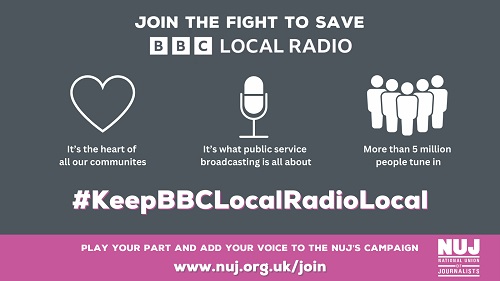Blue day for Cambridge and Oxford local TV
Today (December 16, 2022) is the last day the Cambridge-based Look East and Oxford-based BBC South Today will be broadcast, despite widespread opposition from MPs, councillors and local people.
This ends a quarter of a century of local programming at the cities, with Oxford to be covered from Southampton and Cambridge from Norwich
Paul Siegert, NUJ national broadcasting organiser, said:
“From today the BBC is no longer as local as it once was. Licence payers in Oxford and Cambridge now get a poorer service than people living in other parts of the country and that is not what the BBC should be about. We have had a 45-day consultation period where everyone told the BBC they were opposed to this decision, yet they have gone ahead and axed the services anyway.”
Fae Southwell, mother of chapel for the Cambridge TV newsroom said:
“This is devastating for the TV team in Cambridge. Consistently for years we have produced quality output on a tight budget. To know that many of the team will lose their jobs in the New Year is truly upsetting. We have won awards for our coverage. Audiences in the East will be poorly served by the new programme, which will cover a much wider broadcast area, and will therefore include less local news for viewers, and will be less relevant.”
Anna Wagstaff, NUJ Oxford branch secretary, said:
“For 22 years we in the Oxford area have been relying on the television news team at BBC Oxford TV to ask questions about the services we depend on and the environment we live in, and to keep us in touch with what is happening in all the corners of our community during good times and also times of hardship and crisis. With the ending of this news service, our area is losing something of great value.”
Cambridge police chief constables, fire chiefs and council leaders had written to Tim Davie, BBC director general, asking him to reconsider his plans, saying the programme was an important way "in which all our organisations communicate with communities". When the plans were first announced, Cambridge's MP Daniel Zeichner said: “I understand the pressure that the BBC is under, but the essence of local news is that it is local, and this is a step backwards. Cambridge and the area surrounding is the fastest growing region in the country, with real interest in local stories.”
Oxford city councillors also wrote to Tim Davie saying the BBC's plan to end TV bulletins from the city would undermine local democracy and older viewers’ ability to receive news on their local area. They said: “The value of regional television news services is about more than audience size – it is about an informed public able to hold decision makers to account. Local democracy will be worsened by this BBC plan.”
The BBC said it had to make cuts because the government’s decision to freeze the licence fee left it with a shortfall of £285 million. But the plans are also part of the corporation’s digital-first policy: "We need to make some difficult choices as we adapt our services in line with the growing audience focus on digital services," it said.
The BBC also proposes that BBC local radio stations will share programmes across the network after 2pm on weekday afternoons and evenings and for the whole weekend except for sports programmes. After 2pm on Sunday only national programmes would be aired. Overall, BBC local staffing in England is expected to reduce by around 48 posts. The NUJ believes this will seriously diminish a service that is highly valued by listeners and underpins local democracy.
Stevenage Council added it voice to the protests and its support for local station Three Counties Radio by publicly asserting its opposition to the cuts saying: “We believe that the changes will impact very badly upon: local democracy; the accountability of councils and others; and local information and support for residents.
Find out more on the NUJ’s #KeepBBCLocalRadioLocal campaign page and act in support of your local radio station.

